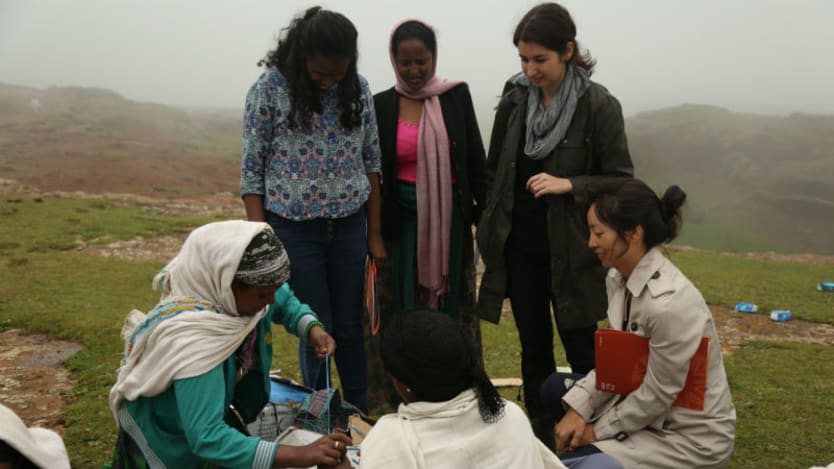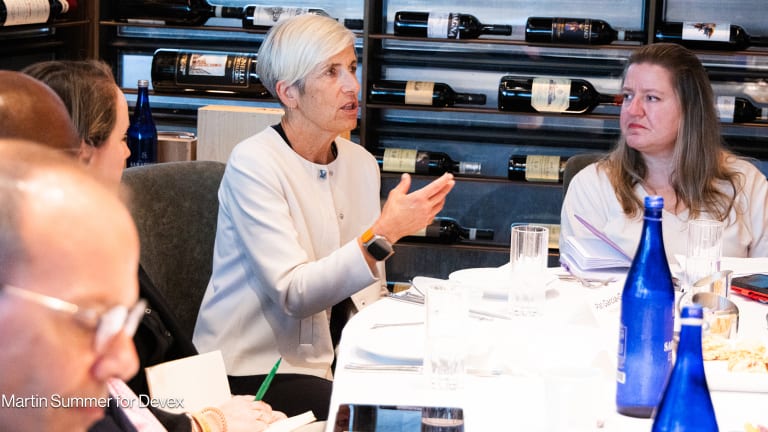
Affirmative action policies don’t help women advance toward leadership in nursing, according to a cross section of nurses who participated in a survey conducted by Johnson & Johnson in partnership with IntraHealth International and the Nursing Now campaign.
60% of the 2,537 respondents — both male and female nurses from 117 countries with a range of experience — said that preferential treatment doesn’t help them advance in their career.
“The results of the survey indicate that affirmative action policies either do not play a role in advancement of nursing leadership or are not perceived as helpful,” said Mei Li, director of health insights at Johnson & Johnson Global Community Impact.
In the global health sector, women make up more than 70% of the workforce, yet only 25% are in leadership positions.
“One interviewee even pointed out that affirmative action policies to help women get into leadership roles could actually undermine women's efforts,” Li said.
This is just one of the findings the “Investing in the power of nurse leadership: What will it take?” report released at this week’s Women Deliver conference, reveals in terms of barriers at work in nursing leadership and the role gender plays.
“To policymakers, definitely look at policies that address gender equity and make sure there’s career projection for nurses in the global workforce.”
— Mei Li, director of health insights, Johnson & Johnson Global Community ImpactSitting down with Devex, Li shared a few more of the key findings, explained why nurses are critical to global health progress, and how to prioritize them to tackle the global health workforce shortages.
This conversation has been edited for length and clarity.
How does Johnson & Johnson see the role of nurses within the global health workforce?
Nurse leadership report key findings
1. Societal and cultural perceptions about specific roles of women and men are a barrier to women’s leadership.
2. The “glass ceiling” and “glass escalator” effects co-exist in nursing.
3. Female nurses have to juggle paid work and unpaid care.
4. Nurses perceive limited decision-making authority regardless of gender.
5. A lack of self-confidence is a barrier to assuming leadership positions.
6. Facilitators to success in women’s leadership include family and spousal support, leadership training, access to networks and mentorship.
The role of nurses is critical and the backbone of primary care. I believe now with unprecedented advocacy for universal health coverage, the role of nurses is huge and cannot be understated. We all know that prevention is better than treatment — both in terms of economics and a person's well-being — and this positions nurses to lead our efforts as a nurse’s primary role is prevention and early treatment.
When someone gets sick, if they have access to a nurse, they don't have to wait until late in the game to start treatment. Nurses are there from the beginning to support patients and, ideally, engage along the way to prevent future illness. They work throughout the life cycle of health care, from when a person is born to when a person is dying. Nurses are at the center of health care.
But for many, access to a nurse is getting more and more challenging. There is a projected shortage of 18 million health workers by 2030, and 9 million of them will be nurses and midwives. Some of the aspects that contribute to that shortage include work safety, decent jobs, appropriate compensation, and career development.
These limitations are all well-known aspects of the health workforce, but for nurses, these barriers significantly contribute to that shortage. If we want to address the shortage, we have to look at these domains to make a real difference.
And what can you tell us about the key findings of your report?
The findings are bucketed in terms of barriers and what works to overcome challenges, such as culture mechanisms, gender segregation of job tasks, and how professional and family life affect nursing leadership and decision-making.
One thing we have found is that respondents feel they have to work extra hard to prove themselves; they’re competent but they feel they have to prove that to get credibility. One interviewee pointed out that competence and credibility are not necessarily gained by education and that they had to articulate how nursing contributes to health care overall — so articulate not only demonstrate.
In terms of actions, we hear loud and clear from the nurses that they need more resources and equipment so they can do better in their jobs and make a difference. Leadership training is one area where most nurses say they would like to receive support, specifically training on being able to speak up in settings where doctors are the leaders in the room and how to articulate their ideas.
With these two examples, both are actionable things that we can do right away. But we also found that there are more complex issues that we really have to tackle as a community.
What are those more complex issues that really need to be addressed?
A complex challenge that communities have to tackle is double discrimination within nursing. Nursing is predominantly seen as a female profession and so there is the gender challenge, but on top of that you have cultural biases associated with nursing — it's perceived as feminine. These are the cultural, gender challenges we need to address.
We had respondents from different regions that showed us different regional, cultural dynamics whereas respondents from Latin America, the Middle East, and even Alaska said things unconsciously like, “that is a male nurse's job.” A male nurse working in the mental health department said that people automatically assume certain tasks are his. That's a challenge we face in terms of how gender segregates the task.
Lastly, there's the professional-family, or work-life, balance part and this could be addressed with public awareness raising. Nurses say that when their families help out at home, they are able to advance more at work.
What is Johnson & Johnson doing to tackle some of these challenges?
Report recommendations
1. Change the perception of the nursing profession as a “soft science.”
2. Address occupational sex segregation and eliminate the perception of nursing as “women’s work.”
3. Eliminate employer discrimination on the basis of gender or child-bearing status.
4. Build nurses’ self-confidence to assume leadership positions.
5. Ensure workplace environments are safe and responsive to work/life balance.
6. Ensure opportunities for nurses to access funding for further development.
7. Foster increased access to professional networks and mentoring schemes for nurses.
We try to change public perception and also have programmatic actions directly targeting nurses and midwives and leadership skills specifically. For example, our nursing campaign focused here in the U.S. for the past 25 years has worked to change the public perception of nursing. Our campaigns seek to support nurses currently in the profession, but also young people curious about the profession but don’t know how to find their way into the field.
There is also a programmatic effort in terms of building nursing leadership on things like, “how do you speak up and how do you communicate.” We work with the International Confederation of Midwives on building leadership skills to equip them, particularly around, “how do you talk about policy” and “how do you talk to your ministry.”
We also recently launched the Nurse Innovation Platform, a campaign focused on leveraging the insights of nurses to develop the next breakthrough innovation for patients. We just announced the first winners of our Nurse Quickfire Challenge — one is an innovative product to help breastfeeding and one is an app to help children relax during anesthesia.
We try to position nurses as doing more than just taking care of patients. That's primarily what they do but they also really take the lead in changing health care practice to better care for patients.
What can the broader global health community do to tackle this issue?
The global health community should definitely look at policies that address gender equity and make sure there's a clear career path for nurses in the global workforce.
For advocates — and we could all do more in terms of raising the profile of nursing and the profession — there's a lot that needs to be done. One thing that everybody can do right now is thank a nurse. Go on social media and tag a nurse that you know to say thank you or share how a nurse you know is changing lives. Everyone can mention a nurse that cared for them, and now is the time to do our part to raise the profile of nursing as a profession; that's something that we can all do to help.
To report the report in full, click here.








